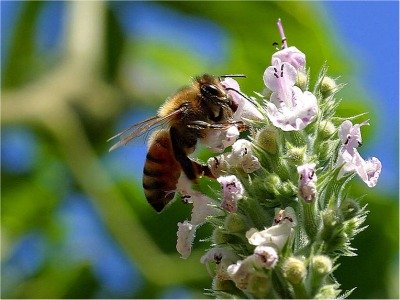
I told myself I’d never go to another generic (local) bee club meeting again. But I was suffering from spring/bee fever so I decided to attend a meeting held by a new (to me) bee club. The topic was “Spring Preparation”. It started out harmless enough with people making motions and seconding them, saying “aye” and all that fun stuff. Then, a first year beekeeper told everyone about a colony that he checked on a recent warm day only to discover that it was dead. He explained that it was very strong up until Christmas. The president of the club asked if he treated for mites (because of course, if he didn’t, that explains it). Well, in fact he did treat it. Not because he had mites or any other problem. The reason? “Because I already bought the treatments, so I figured I had better use them up.” I wondered if the bees were actually dead in the first place. I poked my finger up hesitantly and when given the nod asked what he did with his “dead” colony. “I cleaned all the bees out and stored the hive in my garage.” I asked if anyone had seen the video going around of bees coming out of “torpor” while a very experienced beekeeper is cleaning out an apparently dead hive. Silence. I briefly explained that bees can seem dead and remain that way for a few days, even when it is warm, and this condition is known as torpor. Shoulder shrugs all around. One member finally chimed in, “Well, you have to put those frames away in an unheated garage to protect them from the wax moths. That’s what it says in the book.” The book? Wax moths? It’s February. And we’re in Pennsylvania. Were wax moths going to move in to an ice cold hive now? So with that settled, it was on to spring preparation. What was the first suggestion? “Get those (Mite-Away Quick) strips in there!” Just get them in there. Treat early and often. Don’t check to see if any of your colonies are dealing with mites and not dying. Don’t acquire queens from genetic stock with hygienic traits. Just treat your one or two hives as if you were a commercial honey producer who depends on every single colony to produce as much honey as possible at any cost. Yeah, I wasn’t having fun. They referred to colonies that made it through winter (treated, wrapped, and loaded with syrup and fondant) as “survivors”. Those are the ones you split because they are survivors. My first thought was “How would one go about splitting a colony that didn’t survive.” But more importantly, is a colony that you babied and treated and fed all season really a survivor? I don’t think so. Hey, if you’re so emotionally attached to every single colony that you can’t bear to see one die for the betterment of the gene pool, then treat away. But don’t call them “survivors”. Survivors deal with mites without treatments, build up at the right time, and don’t require constant feeding to store enough for winter. You know, the way they’ve done it for millions of years.
The rest of the meeting was spent talking about how many packages everyone was getting from the “old -timer” of the group, a commercial treater selling treatment-dependent bees that will eventually flood the area with weak, non-adapted genetics by way of drones. There was no discussion of swarm traps or catching (possible) feral swarms which is what I’m most excited about. Then the “newbies” were paired up with “qualified” mentors (who will most likely familiarize them with the treatment treadmill) and the meeting was adjourned. I didn’t get a chance to ask if anyone in the room didn’t treat their bees or didn’t plan to.. I doubt anyone would have raised their hand in this group. I’m going back next month just to ask and see what response I get. This should be fun.

Excellent commentary!
LikeLiked by 3 people
Reading this was deja vu, all over again. I’ve been to this meeting. This is a classic example of the “Dominant Model” that’s been the mainstay of the industry for years. Sadly, it doesn’t work any more, but it seems we’ll keep doing what we’ve been doing…likely getting the same thing we’ve been getting.
LikeLiked by 4 people
Going to Bee meetings can be educational in more than one way. I’ve been to 1 meeting 1 time only. I did meet some nice people, but it wasn’t a good fit for me either. Treating with something just because you have it around is a bad idea.
I went to that meeting with a cousin of mine. His grandfather told me there were no ferals anymore. This was back in 2010. He also told me I wouldn’t be keeping bees long if I didn’t treat. Since then I don’t think he has had a honey harvest… I have lost some bees and learned some lessons, but haven’t bought any bees. Everyone wants to keep bees like they are a pet dog and that just won’t work. Beekeeping is a thinking PERSON’S activity. Even though there are books out there on the subject, it requires a observational biology to be successful. You can’t get that from a book. It takes “learning” bees.
Good luck if you go back.
LikeLiked by 2 people
Oh I’m definitely going back. Now that I know what I’m dealing with, I’ll be better prepared to ask clear questions and respond to the inevitable accusations. I’m optimistic that someone getting started may hear what I have to say and decide to take the treatment-free approach. With so many tf resources now available, the argument that one cannot keep bees without treatments is so disproven to be almost laughable.
LikeLiked by 2 people
Not almost laughable…. TOTALLY laughable!
LikeLiked by 2 people
I don’t go to bee meetings anymore. It’s just too painful to hear the president bang the table when telling everyone they’ve got to treat for mites. I got tired of bringing up the fact that there are some 30 other mite species in the hive, (Michael Bush, The Practical Beekeeper). If you’re killing varroa, you’re killing those other mites too, some of which can be beneficial. Plus, you’re making the bees weak because the mites will eventually become resistant to the poisons at the expense of the bees who haven’t learned to adapt. Silence…”Time for a break.” Sigh.
LikeLiked by 2 people
Oh this is soooooo familiar!! The look of shock and horror when I say I don’t treat, or give my bees an insurance policy feed of fondant and candy on Christmas Day as a ‘present’ – and apparently I am the one who is being irresponsible…by allowing my bees to find their own forage, eat their own honey and deal with the mites in their own way.
LikeLiked by 2 people
And they wonder why we’re in the mess we’re in. But now they have “mite bombs” as an excuse too.
LikeLiked by 1 person
Yes! And interesting to hear this attitude that so many beekeeping groups have, wherever you are in the world 😉
LikeLiked by 1 person